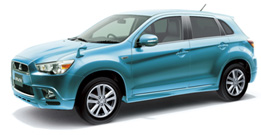Mitsubishi Motors Corporation's new RVR compact crossover has blasted past the competition with front fenders made from SABIC Innovative Plastics' Noryl GTX* resin. The RVR is the second fender success for the Mitsubishi/SABIC Innovative Plastics relationship, which first gave consumers the Delica D:5 minivan in 2007, also sporting front fenders molded from Noryl GTX resin.
 Mitsubishi’s New RVR Compact Crossover Using SABIC Innovative Plastics’ Noryl GTX* Resin for the Front Fenders.
Mitsubishi’s New RVR Compact Crossover Using SABIC Innovative Plastics’ Noryl GTX* Resin for the Front Fenders.
By replacing steel with this high-performance resin, Mitsubishi slashed weight by almost 50 percent and achieved a unique and highly complex geometry to differentiate the new vehicle's styling and improve pedestrian safety compliance. Noryl GTX resin continues to capture increased attention in automotive body panels, underscoring SABIC Innovative Plastics' drive to create new cutting-edge automotive solutions.
"The new RVR's front fenders mark another major milestone for SABIC Innovative Plastics' award-winning Noryl GTX resin, which is rapidly becoming the material of choice not only in fenders, but in an ever-broadening range of auto body components, as well," said Gregory A. Adams, vice president, Automotive, SABIC Innovative Plastics. "This win with Mitsubishi is very significant in that it is the first time an Asian automaker has reprised its use of Noryl GTX resin. Clearly, our work with Mitsubishi reflects the development expertise of both companies and is a tremendous benefit to consumers around the world."
In developing the RVR as the company's newest compact crossover, Mitsubishi engineers made every effort to reduce part weight in order to achieve best-in-class fuel efficiency. Noryl GTX resin has made a major contribution by reducing vehicle body weight by 3 kg (6.6lbs). Mitsubishi has already announced that it will introduce this new environmentally responsible vehicle, branded as the Mitsubishi ASX, to the European market later this year, and will follow with expansion into many other regions of the world.
Multiple Benefits from a Single Resin Technology
Noryl GTX resin provides a solution to top challenges facing today's automakers. It significantly reduces part weight to help cut fuel consumption and emissions, and has been audited by GreenOrder, an environmental strategy firm. According to GreenOrder, because the resin is 50 percent lighter than steel, equipping all cars on the road today in Europe with fenders made from Noryl GTX resin would save 530 million liters (140 million gallons) of fuel and avoid 1.3 million metric tons (1.43 million tons U.S.) of carbon dioxide emissions.
The material also provides greater design freedom than metal. By injection molding Noryl GTX resin, Mitsubishi designers were able to create a complex fender geometry featuring a sharp front edge and a side slot for an indicator lamp. Such a design would have been difficult to fabricate in steel as it would require multiple steps, tools and operations.
The SABIC Innovative Plastics resin also enabled Mitsubishi designers and engineers to significantly increase the fender's flexibility vs. that of steel. This enhanced flexibility is expected to provide excellent head impact absorption in pedestrian incidents, as well as recovery of the fender from minor collisions.
During vehicle production, Noryl GTX resin helps reduce complexity and shorten cycle times. Its high-temperature resistance and intrinsic conductivity allow the fenders to be on-line painted without the need for a conductive primer, and deliver painted aesthetics equivalent to steel. To optimize on-line painting of the plastic fenders along with the steel body, careful part design and processing were essential. SABIC Innovative Plastics assisted Mitsubishi by sharing its expertise in CAE-based parts performance prediction and molding support, as well as supplying the high-performance Noryl GTX resin.
RVR Fenders are Latest Milestone for Noryl GTX Resin
Noryl GTX resin has been used in auto fenders for more than 20 years. Since 1988, more than 20 million vehicles have been manufactured with fenders made from Noryl GTX resin in Europe, the United States, Japan, South America and China. Automakers that have chosen these fenders over the years include GM, Ford, Volkswagen, Renault, PSA Peugeot Citroen, BMW, Audi, Land Rover, Mercedes-Benz, Mitsubishi, and Nissan.
The material was honored in 2009 for its key role in helping General Motors (GM) 1987 MY Buick LeSabre T-Type fenders win the coveted Hall of Fame Award and the Ford Kuga fenders win the Safety category award for enabling pedestrian safety compliance from the Automotive Division of the Society of Plastics Engineers (SPE).